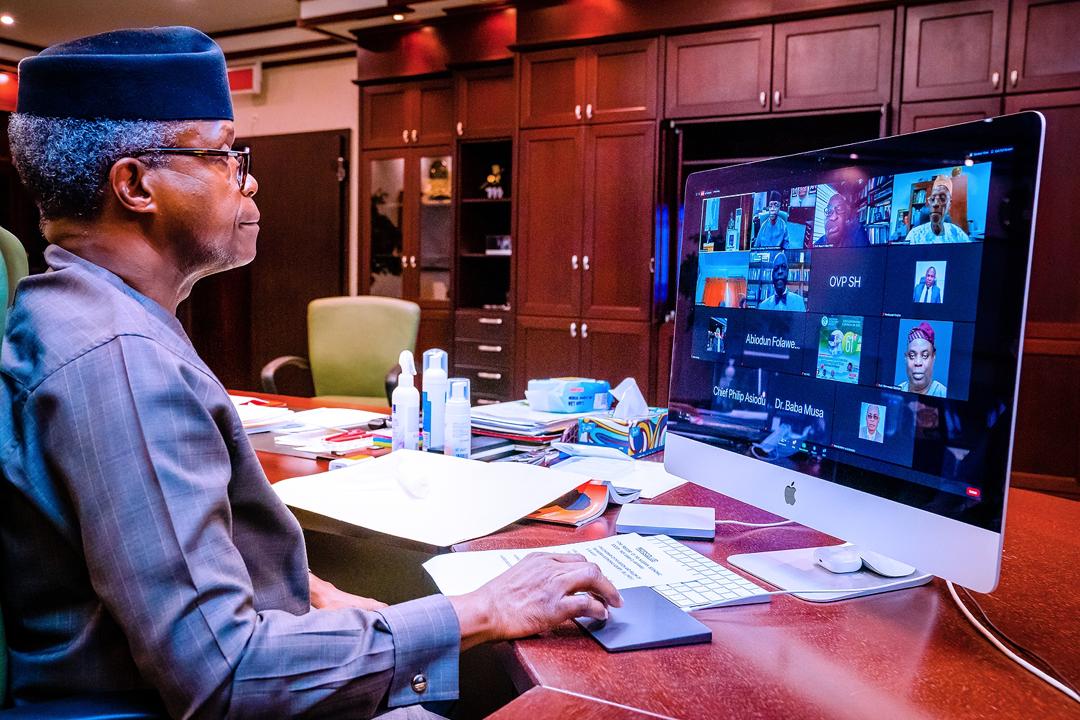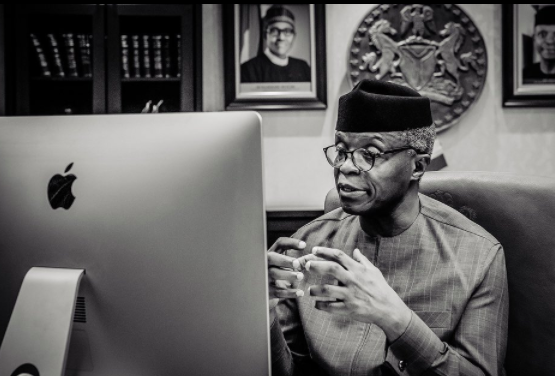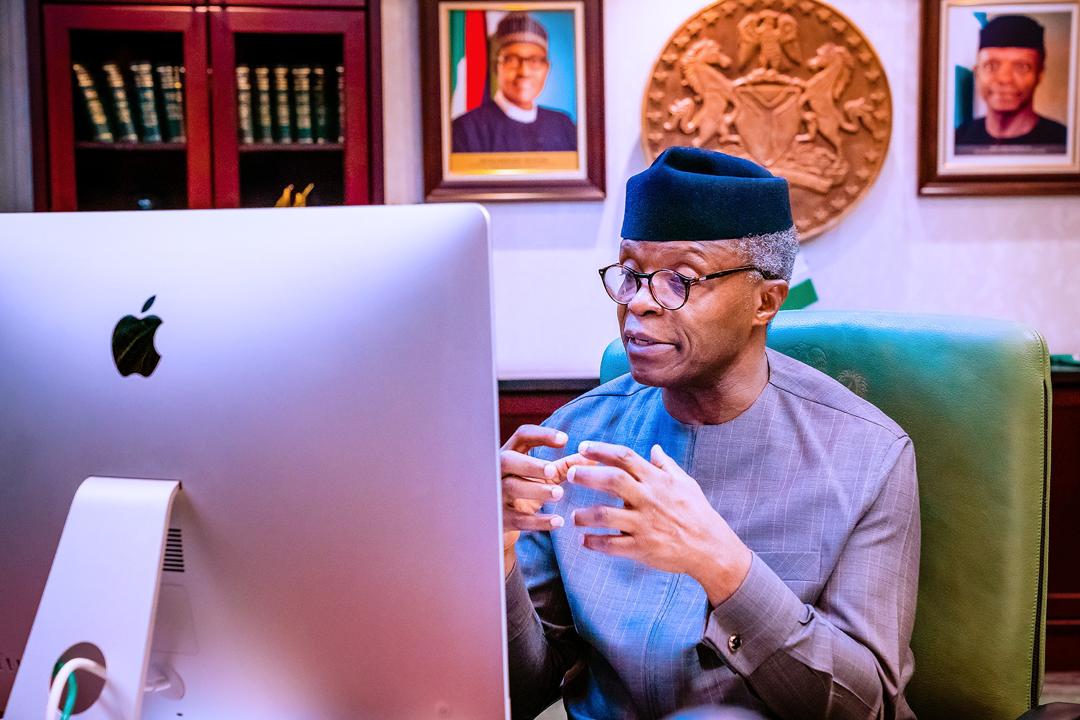2020 Virtual Conference Of The Nigerian Economic Society, Themed: African Continental Free Trade Area (AfCFTA) In Post COVID-19 Era
SPEECH BY HIS EXCELLENCY, PROF. YEMI OSINBAJO, SAN, GCON, VICE PRESIDENT, FEDERAL REPUBLIC OF NIGERIA, AT THE 2020 VIRTUAL CONFERENCE OF THE NIGERIAN ECONOMIC SOCIETY, THEMED: AFRICAN CONTINENTAL FREE TRADE AREA (AfCFTA) IN POST COVID-19 ERA: WHAT NEXT FOR NIGERIA? ON FRIDAY 11TH SEPTEMBER, 2020
PROTOCOLS
I am honoured by the kind invitation to speak at your 61st Annual Conference. And I must say that the President and members of Council deserve our commendation for convening this virtual conference of our leading economists across the country against all odds. Clearly COVID 19 has lost the battle to technological ingenuity and the human will.
The theme of this annual Conference – the African Continental Free Trade Area in the Post COVID-19 era: What next for Nigeria? is particularly apt. The outbreak of the COVID-19 pandemic and the accompanying global economic shutdown could not have come at a worse time for the African Continental Free Trade Area because trading was to have started on 1st of July 2020. This has meant a delay in reaping some of the expected benefits of the AfCFTA.
The theme is also relevant because the COVID-19 pandemic has impacted negatively on almost all African countries and will have lasting effects on several economic sectors and activities. It is therefore incumbent on Nigeria as the largest economy in the AfCFTA and with possibly the largest assemble of the finest Economic minds to begin to think through what all these developments mean for us nationally and regionally.
The AfCFTA is expected to bring about a number of benefits to producers, consumers and countries alike. The hope is that African producers would benefit from access to cheaper inputs and intermediate goods as well as larger markets for their products while consumers have access to cheaper goods and a broader variety of products. On their part, African economies should experience gains from trade and further benefit from removing the onerous requirements of belonging to multiple and overlapping trade agreements within the continent.
The Economic Commission for Africa has estimated that with full liberalization, intra-Africa trade would increase by 52.3% as compared to a baseline scenario without AfCFTA by 2022. Such an increase means that African economies will benefit from the growth that often accompanies increased trade flows.
First, where are we in the journey with the AfCFTA?
It is probably worth noting that Nigeria played a very active role in the negotiations that brought the AfCFTA into being and the main intensive stages were chaired by the late Ambassador Chiedu Osakwe who was then the Director-General of the Nigerian Office for Trade Negotiations. The creation of the NOTN was a deliberate decision by this Government to change our approach to trade negotiations by ensuring that our participation is underpinned by top class technical knowledge and adequate preparations.
A considerable amount of work had been done before the suspension of activities relating to the operationalisation of the AfCFTA. Work was on-going on the schedule of tariff concessions for trade in goods, trade in services and for rules of origin. For instance, it had been agreed that the schedule of tariff concessions would permit 10% of tariff lines of member States to be included in an Exclusion List that is not subject to liberalisation and a Sensitive Products List which is subject to negotiated liberalisation. Also, five sectors have been identified as the initial priorities for negotiations in trade in services namely transport, communications, tourism, financial services and business services. Similarly, product specific rules of origin had been agreed on 88% of product lines with work on key products like cotton, textiles sugar and automobiles still outstanding before the delays occasioned by COVID-19.
All of this work was disrupted by the outbreak of the pandemic but it is essential to reach agreement on them before actual trading can start as specific details are required so that customs authorities can make necessary changes to their tariff books. Trading was supposed to start on 1 July 2020 but the take-off date has now been shifted to 1 January 2021. So, virtual meetings of trade negotiators, Senior Officials and even Ministers have been held to keep up the momentum. But it seems that there are challenges with communication, reliability and even confidentiality. All these outstanding Phase 1 issues would need to be completed before negotiations move to Phase II which will deal with Competition Policy, Intellectual Property and Investment.
The immediate challenge is to bring our economies back to normalcy across the continent. And although Africa has been relatively fortunate in terms of the actual health damage of the pandemic, our business and trading populations will need assurances of safety from the virus before regular economic activity nationally and regionally will return to normal.
Besides, it would be difficult to restore full economic activities without facing the dangers of a second wave and further economic disruption. Business as usual it seems will only return with the availability of a vaccine. But even this may like trade be affected by the power configurations between the global south and the north. Today one of our concerns in Africa is that because the wealthier countries have literally prepaid for the earliest supplies of the vaccine it might take a while for us to get immunized.
Fortunately, we are a GAVI supported country and are actively involved in GAVI’s effort to ensure equitable global access to COVID-19 vaccines under the COVAX initiative. COVAX, the vaccines pillar of the Access to COVID-19 Tools (ACT) Accelerator, is co-led by the Coalition for Epidemic Preparedness Innovations (CEPI), Gavi, the Vaccine Alliance, and the World Health Organization (WHO) – working in partnership with developed and developing countries vaccine manufacturers. It is the only global initiative that is working with governments and manufacturers to ensure COVID-19 vaccines are available worldwide to both higher-income and lower-income countries.
The challenge of rebuilding our economies is a real one. And we had identified this as a major issue as we entered into the AfCFTA arrangements. Infrastructure, access to capital, GDP growth was -6.1% in the second quarter of 2020, in South Africa which is the second largest economy in the continent, GDP contracted by 51% in the same period. It is quite obvious that if there is no production, there is very little scope for trade but lack of growth and volatile macroeconomic conditions also pose a great danger to the AfCFTA because the instinct of countries is to look inwards and resort to beggar thy neighbour policies such as competitive devaluation and tariff barriers when faced with such difficulties.
Here in Nigeria, the Federal Government adopted the N2.3 trillion Economic Sustainability Plan (ESP) with a view to mitigating the shock, tackling vulnerabilities, creating and protecting jobs, rescuing businesses and repositioning the economy. Our projections showed that without the stimulus the economy was set to contract by -4.4% in 2020 but with implementation including ramping up local production we should be able to limit the negative growth to -0.59%. Let me be clear, our desire to ramp up local production is not a call to autarky but rather an expenditure switching approach which can complement the AfCFTA desire to deepen regional value chains.
Indeed, one thing that has become clear from our experiences of the last few months is the need for a vibrant and successful AfCFTA. The pandemic has exposed our dependence on commodity exports to other parts of the world and on the import of manufactured goods from them. As at 2017, intra-Africa trade in goods was $135 billion which was just about 15% of Africa’s total trade. This is in sharp contrast to trade in other regions which is as high as 70% in the European Union and 60% in Asia. The imposition of export bans including on food items by some countries and the disruption of global supply chains at the height of the pandemic showed just how exposed and vulnerable African countries are because of limited productive capacity and a lack of regional value chains.
We must of course continue to bear in mind especially here in Nigeria that the AfCFTA is not a magic wand that automatically brings about growth and prosperity. The reality is that if care is not taken trade liberalisation can expose the Nigerian economy to unfair competition and sharp trade practices with adverse consequences for our producers who might have to close down their businesses and for our workers who would then lose their jobs.
We need to be proactive if we are to participate effectively in the AfCFTA. This will entail improving our ability to produce and trade competitively in goods and services which is why the Federal Government is investing heavily in power, road, rail and port infrastructure projects. It is also why we are taking active steps to improve the business environment and to facilitate trade across our borders including through the implementation of the National Trading Platform or Single Window Project. Part of that project is the installation of scanners at our ports
Government also realizes of course that it needs to be able to enforce trade rules and apply trade remedies so that our partners in the AfCFTA, especially our neighbours, do not take undue advantage of our large market. We do appreciate of course that the border closure has caused difficulties for many of our businesses and active steps are being taken to resolve the situation especially by consulting closely with neighbouring and proximate countries to address the issues of concern to us with regard to unbridled smuggling into the country. You will be glad to know that the National Action Committee on the implementation of the AfCFTA which is chaired by the Honourable Minister of Industry, Trade and Investment is actively seized with these matters.
If the AfCFTA is to achieve the desired objectives, then it is also very important that Nigeria should push for the implementation of complementary programmes and protocols including the Protocol on Free Movement of Persons, the pan-African payments system and other sectoral programmes.
Quite unlike the AfCFTA Agreement, the Protocol on Free Movement of Persons is not gathering the desired pace of ratifications perhaps because of the fear of migrants outcompeting nationals for jobs and the likely social tensions in recipient countries. However, since the movement of persons is key for trade especially, trade in services, such as tourism and, professional services, then it stands to reason that the success of the AfCTFA in the medium term would require a faster rate of ratification and implementation of the Protocol on the Free Movement of Persons. Similarly, the establishment of the Pan-African Payments and Settlement Platform by Afrieximbank will go a long way to creating the desired continental payments system and in enabling cross-border informal trade which is estimated to be about $93 billion per annum.
In the area of health, the COVID-19 crisis has shown the importance of regional cooperation to come up with a continental resilience strategy to cope with similar shocks in the future. A salutary example is that of the African Centre for Disease Control and Prevention (Africa CDC) using digital pooled procurement system to order for chemical re-agents, diagnostic and medical equipment given that orders for test kits and health equipment by African countries tended to be small and ignored at the height of the crisis.
Successful implementation of the AfCFTA requires financing to address various implementation challenges and to promote arrangements in support of integration. For instance, in addition to making up for potential losses of tariff revenue, African countries will face implementation costs including undertaking reforms, establishing new trade related bodies, and improving and upgrading existing facilities. In addition to these domestic measures there are also costs associated with establishing the CFTA Secretariat and building regional infrastructure. Finding the resources to undertake these activities at a time like this when we lack fiscal space will of course prove to be very difficult for Nigeria and other African countries. Our economists should accordingly help to come up with innovative financing solutions for our economies.
One important objective of the AfCFTA is to overcome the economic fragmentation of the continent by bringing the regional economic blocs together in a common arrangement. This being the case, African countries should look to negotiating trade treaties with other parts of the world on the basis of AfCFTA rather than through arbitrarily designed regional blocs. African countries should not allow themselves to be lured into arrangements which do not serve their long-term development objectives.
In summary then apart from reducing the spread of the COVID-19 virus and mitigating its effect on the domestic economy, Nigeria must have an interest in promoting an AfCFTA that catalyses regional value chains, enables free movement of people, attracts investments and improves the continental payments system. As we seek to use the opportunities, we should remain alert to the need to create conditions that will enable our businesses to be able to compete and thrive within the AfCFTA. We can no longer plan without fully considering the AfCFTA, all planning and budgeting documents must take it into account. This explains why the current successor plan to the ERGP has the AFCFTA as an important reference.
In closing, permit me to use this opportunity to call on members of Nigerian Economic Society to be more engaged in public policy debates. I find every often that some public commentators make assertions that have no basis in economic theory or practice and because they dominate the public space they contribute to public misunderstanding of economic principles and their application to public policy. I know that there are doctrinal differences and that not every academic economist is cut out to write newspaper columns but I am told that Milton Friedman wrote a regular column in Newsweek Magazine and that Paul Krugman who is of an entirely different economic persuasion continues to write for New York Times. Some of you should take up the gauntlet and help to shape an informed and reasoned national discourse on the economy.
I am glad to have had this opportunity to speak to this distinguished gathering and I thank you very much for your kind attention.




